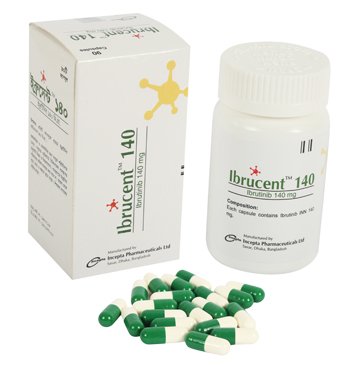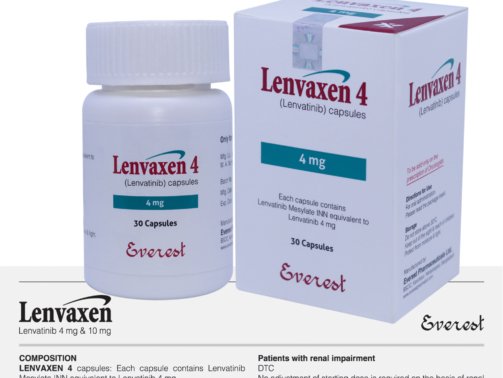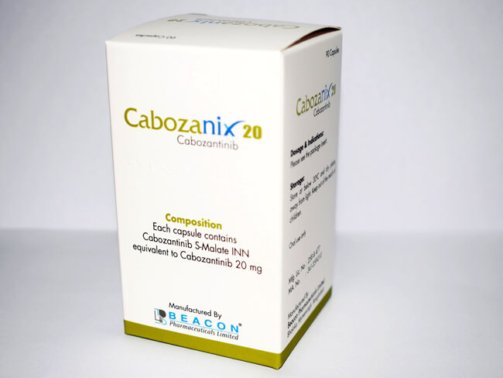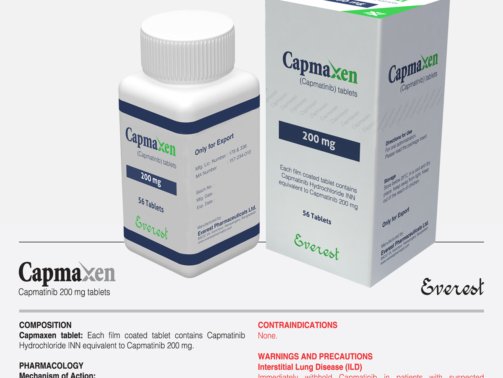Ibrutinib 140 mg (Imbruvica)
0.00$
Ibrutinib is a small-molecule inhibitor of BTK. Ibrutinib forms a covalent bond with a cysteine residue in the BTK active site, leading to inhibition of BTK enzymatic activity. BTK is a signaling molecule of the B-cell antigen receptor (BCR) and cytokine receptor pathways. BTK’s role in signaling through the B-cell surface receptors results in activation of pathways necessary for B-cell trafficking, chemotaxis, and adhesion. Nonclinical studies show that ibrutinib inhibits malignant B-cell proliferation and survival in vivo as well as cell migration and substrate adhesion in vitro.
Ibrutinib 140 mg is an oral drug that contains Ibrutinib as its active component and is mainly employed for treating specific forms of blood cancer. It is part of a category of medications called Bruton’s tyrosine kinase (BTK) inhibitors, which function by inhibiting certain proteins that facilitate the growth and survival of cancer cells. Ibrutinib 140 mg, produced under strict quality standards, provides a targeted treatment option for patients battling complex hematologic malignancies.
Mechanism of Action
Ibrutinib, the active ingredient in Ibrutinib 140 mg, selectively attaches to and inhibits Bruton’s tyrosine kinase (BTK), which is a crucial enzyme in the B-cell receptor signaling pathway. This inhibition interrupts the survival and proliferation of malignant B cells. Ibrutinib prevents the abnormal growth of B lymphocytes by blocking this enzyme, which is a common feature in cancers like chronic lymphocytic leukemia (CLL) and mantle cell lymphoma (MCL).
Indications
Ibrutinib is authorized and commonly utilized for treating:
Chronic Lymphocytic Leukemia (CLL), including cases that have a 17p deletion
Mantle Cell Lymphoma (MCL) in individuals who have undergone at least one previous treatment
Waldenström-Makroglobulinämie (WM)
Marginal Zone Lymphoma (MZL) after at least one prior anti-CD20 treatment
Chronic Graft Versus Host Disease (cGVHD) occurs following the ineffectiveness of one or more systemic treatment lines.
The indications for this medication may differ based on the regulatory approvals of various countries, and it should be utilized only under the supervision of a qualified healthcare provider.
Dosage and Administration
It is common to take Ibrutinib 140 mg orally once each day. The usual dosage may vary depending on the condition being treated. The medication is usually taken at the same time every day, regardless of meals. Swallowing the capsule whole with water is crucial—do not open, crush, or chew it.
Patients should adhere closely to the dosage instructions provided by their doctor. It may be necessary to adjust the dosage depending on how well the patient tolerates it, how they respond to treatment, or whether drug interactions are present.
Side Effects
Ibrutinib 140 mg, like all medications, has the potential to cause side effects. Usual side effects may include:
Durchfall
Müdigkeit
Übelkeit
Musculoskeletal pain
Hematomas or hemorrhaging
Rash
Reduced appetite
Less common but more serious side effects include:
Irregular heartbeat or atrial fibrillation
Infectious diseases (bacterial, viral, or fungal)
High blood pressure (hypertension)
Internal bleeding or hemorrhage
Cytopenias (reduced blood cell counts)
Patients experiencing symptoms such as chest pain, unusual bleeding, shortness of breath, or indications of infection like fever or chills should seek immediate medical attention.
Precautions and Warnings
Risk of Bleeding: The use of Ibrutinib could elevate the risk of bleeding; individuals on anticoagulant therapy or with a past of bleeding disorders should be careful when using this medication.
Infections: As treatment may compromise the immune system, it is advisable to take preventive measures against infections.
Heart Conditions: Those with heart disease or a history of arrhythmias should be carefully monitored during treatment.
Pregnancy and Breastfeeding: The use of Ibrutinib 140 mg during pregnancy or breastfeeding is not recommended, as it may be harmful to the unborn or nursing child.
Drug Interactions: The concurrent use of strong CYP3A inhibitors or inducers should be avoided or handled with caution. Inform your doctor about all medications and supplements you are taking.
Storage and Handling
Ibrutinib 140 mg should be stored at room temperature (15°C to 30°C) in its original packaging, protected from moisture and direct sunlight. Ensure that children and pets cannot access the medication. Do not utilize the product after the expiration date that is printed on its packaging.
Conclusion
Ibrutinib 140 mg (Ibrutinib) represents a significant advancement in treating specific hematologic cancers. It provides a new and efficient way to regulate the advancement of B-cell malignancies by targeting the BTK pathway. Although it has demonstrated considerable advantages in enhancing patient outcomes, effective medical oversight, compliance with dosing guidelines, and understanding possible adverse effects are crucial for optimizing its effectiveness and safety.
Always seek personalized advice from your healthcare provider to ascertain if Ibrutinib 140 mg is the appropriate treatment choice for your medical condition.
Order Now At Mdx Pharma bd….
To order from MDX Pharma BD, visit their website at https://mdxpharmabd.com, where you can browse products and place orders online. For inquiries or orders via email, contact emedicarepharma@gmail.com. Alternatively, call (+88) 01929123476. Their address is 29, Abdullahpur, Uttara, Dhaka-1230, Bangladesh.
1. For what purpose is Ibrutinib 140 mg used?
Ibrutinib at a dosage of 140 mg, is employed in the treatment of different forms of blood cancer, such as:
Chronische lymphatische Leukämie (CLL)
Lymphoma, small lymphocytic (SLL)
Mantle cell lymphoma (MCL)
Waldenström-Makroglobulinämie (WM).
2. What is the mechanism of action of ibrutinib?
Ibrutinib acts as a Bruton’s tyrosine kinase (BTK) inhibitor. It inhibits the action of BTK, a protein that supports the growth and survival of malignant B cells. Ibrutinib slows or halts cancer progression by inhibiting BTK.
3. What is the correct way to take Ibrutinib 140 mg?
Take Ibrutinib exactly as your doctor prescribed, which is usually once a day, and make sure to drink a full glass of water with it. It can be consumed with or without meals, but it is important to take it at the same time daily.
4. Is it safe to use Ibrutinib while pregnant?
No, Ibrutinib is not recommended for use during pregnancy. It could harm the fetus. During treatment and for some time afterward, both men and women should rely on effective contraceptive methods.
5. For what duration do I need to take Ibrutinib?
The length of treatment is determined by the individual condition and how the patient responds. While some patients may use it over the long term, others might require adjustments depending on their tolerance and how effective it is.

 Cart is empty
Cart is empty 



